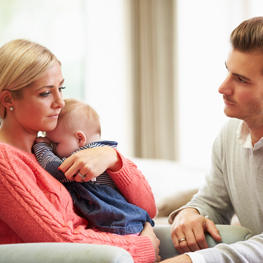
Did you know that it’s common to feel a range of different emotions after your baby is born? You may: feel sad; cry and not know why; be impatient and irritable, sometimes for no clear reason; feel restless and anxious; have difficulties concentrating; feel sensitive; feel tired and/or have trouble sleeping, and have mood swings (e.g., joy to sadness, laughing to crying).If you feel like this, you’re not alone. Many new moms experience these feelings and they’re sometimes called the baby blues. If you don’t feel better with rest, sleep or support from others, or if these feelings last more than two weeks, you may be experiencing postpartum depression.
Postpartum depression can happen any time during your baby’s first year. It affects approximately 1 in 5 mothers. But did you know that birth moms aren’t the only ones that experience postpartum depression? All parents, including dads and parents who adopt, may experience postpartum depression, too.
Getting help when you first notice these symptoms is very important. Untreated postpartum depression can affect the relationship between you and your baby, and with your partner and family. It can also affect your baby’s health and development, if not treated. Sometimes a partner or support person will become aware of these symptoms first. Talk with them about how you’re feeling and ask for their support.
Don’t let your fears of a diagnosis prevent you from seeking help. Postpartum depression is not something that will go away if you just ‘pull yourself together.’
Taking care of you
Coming home with a new baby is an adjustment. Taking care of yourself, both mentally and physically, is another way to take care of your baby. You can do this by saying no to tasks and chores that aren’t urgent. Ask for and accept offers of help from others. Decide when you want to have visitors and how many. Writing down your thoughts or feelings in a journal can also be helpful. Try to remember to take things one step at a time and one day at a time.
Here are some things you can do to help take care of yourself:
If you’re struggling with postpartum depression, you’re not alone. If you have questions or concerns about postpartum depression, or are having difficulties coping or caring for your baby, talk to your health care provider or call Health Link at 811 or the Mental Health Helpline at 1-877-303-2642 for support and information.
Other helpful numbers:
Distress Centre: 1-800-784-2433
For immediate help: 911
For more information on postpartum depression, including services and programs available from Alberta Health Services, call Health Link or visit ahs.ca/ppd.
This information contains excerpts from Alberta Health Services’ Healthy Parents, Healthy Children resources. For more information on postpartum depression or topics related to pregnancy and being a parent, visit healthyparentshealthychildren.ca.
The Healthy Parents, Healthy Children team is a part of the larger Healthy Children and Families’ team at Alberta Health Services. Find them on Facebook at Healthy Parents, Healthy Children or follow on Twitter @AHS_HPHC. For questions or comments, contact This email address is being protected from spambots. You need JavaScript enabled to view it..
Calgary’s Child Magazine © 2024 Calgary’s Child